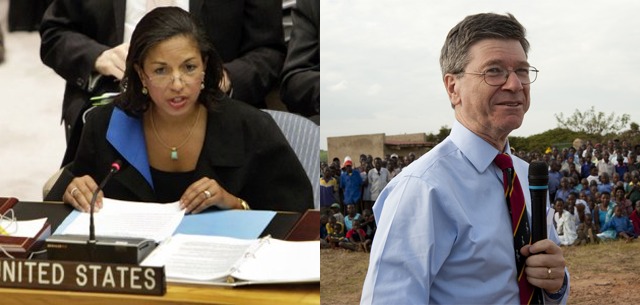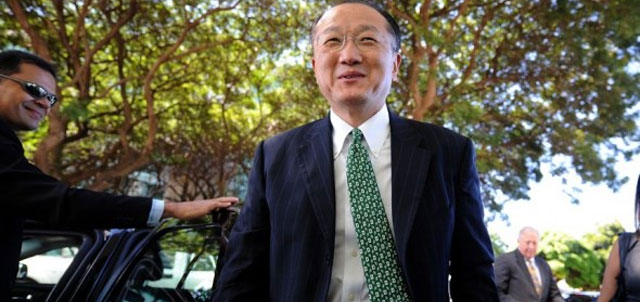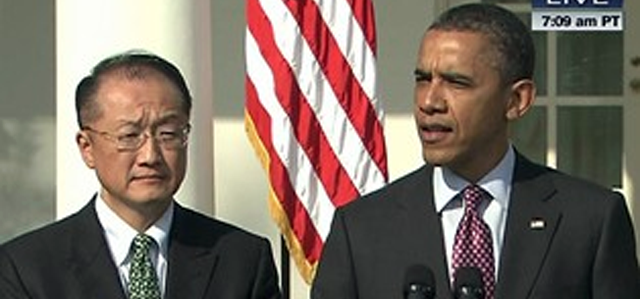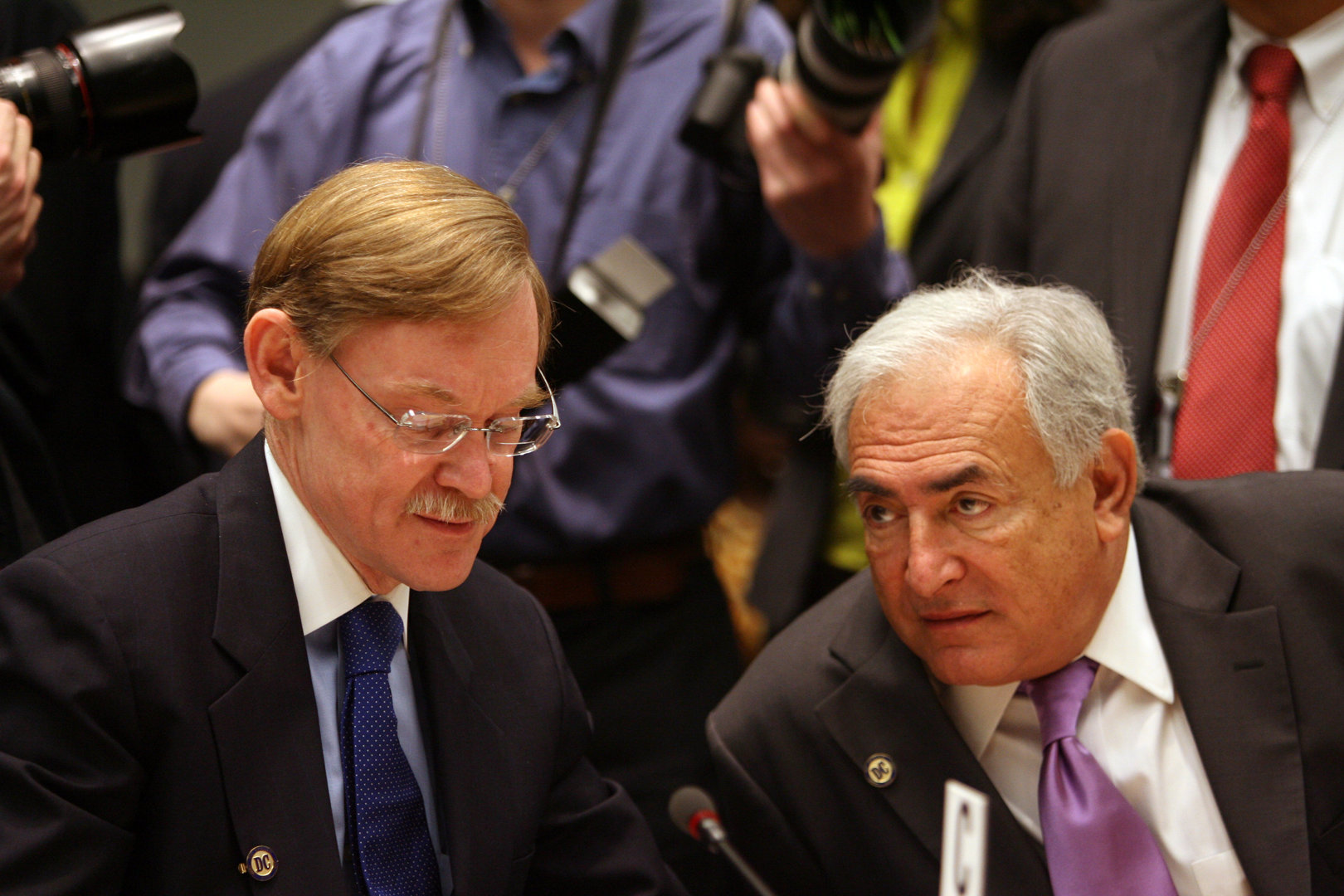The decision on who will be the next World Bank President has become much more interesting in recent weeks.
Civil society groups issues the perennial call for the selection to be opened to non-Americans, and respected development experts have identified highly qualified individuals, both from the U.S. and other states, whom they would support. A number of rumored Americans have denied any interest in the post, and the independent candidacy of Jeffrey Sachs has secured support from the finance ministers or heads of government of 11 World Bank member states.
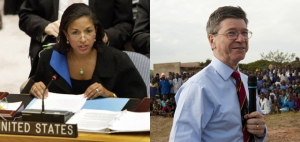
The deadline for nominations is this Friday, 23 March. The Bank’s board is expected to make its selection at its summit from 20-22 April, with the chosen candidate assuming office on 1 July following Zoellick’s departure. The post has always gone to the U.S. nominee (who has also always been an American national), but with only two days remaining, the Obama administration has yet to announce whom it plans to put forward. This has led to speculation that the deadline may be extended. Other Bank members will almost certainly allow such an extension, but it will provide increased ammunition for advocates of a non-American if the U.S. does not announce a nominee soon.
Early rumored candidates included Larry Summers, Hilary Clinton, John Kerry and Susan Rice. The suggestion of Summers as the next Bank President was quickly and decidedly rejected by almost every development group with an opinion. Public Citizen quickly launched the website ForgetLarry.org to gather signatures opposing it (over 17,200 as of today). Clinton quickly denied any interest in the post, noting she plans to leave the government following the American presidential election in November. While neither Kerry nor Rice has removed themselves entirely from consideration, both are rumored to want to succeed Clinton as Secretary of State in 2013.
Jeffrey Sachs’ candidacy has emerged as the surprise of the race. Despite his credentials as a leading scholar and expert on sustainable development, the likelihood of the Bank selecting him to succeed Zoellick was seen as far-fetched. His self-nomination seemed a more celebrity candidacy, aimed to encourage discussion on reforms that he advocates or to position him as a candidate as the Bank’s chief economist.
But others, namely several World Bank members, have taken his candidacy much more seriously. As of today, his candidacy has been endorsed by Chile, Kenya, Time Leste, Haiti, Malaysia, Namibia, Bhutan, Jordan, Guatelama, Ghana and Hondura. Unfortunately, none of these states sit on the Bank’s Board of Directors, and their representation on the Board is split among 9 Directors. Even should the 11 states supporting Sachs convince these 9 Directors to vote for him, they would carry 27.15% of the voting shares, far short of the 85% required for election. (Yes, the election is not by majority vote and, yes, the United States controls 15.74% of the vote, just enough to effectively veto any candidate it does not support.)
But it is not Sachs himself as the potential nominee that is the critical development of this year’s process. What is amazing is that, for the first time in the Bank’s history, there is a serious independent candidacy for President which has garnered notable support from multiple countries. Sach’s candidacy and the level of support he has already secured suggest that the Bank is not entirely resistant to the concept of open, public campaigns for its highest office. This trend, over the last decade, has driven reforms and more open selection processes in the Food and Agricultural Organization, the World Health Organization, the OECD, and for the post of United Nations Secretary General.
At the moment, Sachs has the backing of almost the same number of member states that supported a non-European for the IMF last year, but he still has a way to go in terms of votes that he is realistically likely to get when the Board votes. Whether he can gain more support will depend on whether the ineptitude of emerging economies last year to unite around a single candidate for the IMF head can be avoided this year. If Brazil proceeds with its anticipated nomination of Nigerian finance minister and a former managing director at the World Bank Ngozi Okonjolweala and South African puts forward former UN Undersecretary for economics Jose Antonio Ocampo from Colombia, their nominations could cut off any further support for Sachs where he most needs it–the BRICS nations and other emerging economies. This competition, while a positive in itself, would allow the United States, with European support, to push through its own chosen candidate.
But leaving aside the support of Sachs by a handful of states outside the U.S. and Europe, not to mention the simple historic nature of his candidacy, the real question remains: could Sachs be the American nominee and consequently the next World Bank President?
As noted above, the U.S. controls enough voting shares to deny him the post if the Obama administration puts forward another preferred nominee. Sachs has a number of advantages that do not preclude the U.S. supporting his nomination, the most important his being an American national. (President Obama simply will not support a non-American nominee during this election year.) He has also been endorsed by 27 U.S. Congressman–all Democrats–which could offer the slightest of political cover. His background and expertise in sustainable development clearly qualify him for the post, but the independence he will carry into the post will make it easy for Republicans to criticize his nomination in terms of U.S. interests. That said, Obama is moving into campaign mode and his base would support Sachs’ nomination. Contrast this with the reaction he’d receive if he put forward Larry Summers.
I still consider Sachs is a long shot, but his is far from the celebrity candidacy I initially considered it. If Obama puts forward Summers or Rice, Sachs may still wind up as the chief economist, increasing his chances of being promoted to the top post in 2017 (a non-election year in the U.S.), presuming he earns the trust of the top vote-share holders while in that post.
What of other potential candidates? Susan Rice, the current U.S. ambassador to the United Nations, has not removed herself from consideration, but has described her nomination as “ridiculously hypothetical.” As noted, she is almost certainly more interested in following Hilary Clinton as Secretary of State next year, with her background as a former Assistant Secretary of State and a member of the National Security Council. These talents would be wasted at the Bank. Nonetheless, she would be a formidable nominee and, despite criticism at the United Nations of Russia and China on Syria, would likely gain those governments’ support. (Perhaps they would prefer her at the Bank rather than at Foggy Bottom.)
Other Americans who have been suggested include Indra Nooyi, an American of Indian descent and the CEO of PepsiCo, Senator John Kerry, current USAID Administrator Raj Shah, New York Mayor Michael Bloomberg, former Council of Economic Advisers chief Christina Romer, and Nancy Birdshall who heads the Center for Global Development. Each have their supporters but are unlikely to see the role as a step up or the best option for them at this time. Birdsall is perhaps the most interesting of these, and her nomination, while very unlikely, would not be atypical for Obama. He has previously tapped leading experts from respected civil society groups to take up major roles in his administration, for example, Suzanne Nossel and Victoria Holt. It would also satisfy the rumored goal that Obama wants to nominate a woman for the post.
At this point, I would look favorably to Sachs being selected, not because of his qualifications for the post or his support among American progressives, but rather because his appointment will validate open campaigns for senior multilateral posts. It would also push the Bank more in the direction of those institution which have accepted competitive elections for their top posts. According to Domenico Lombardi, a former World Bank board official now at the Brookings Institution in Washington, we may already be there.
“The impressive credentials of both Ocampo and Okonjo-Iweala puts tremendous pressure on the White House to come up with a candidate of at least equivalent standing… This is the first time in history we have a truly contested election,” Lombardi said.
Unfortunately, Sachs is not likely to pick up any additional support, as everyone is holding their breath until Friday’s deadline passes or the U.S. names a candidate, and to see if other nominees are put forward.
That no word has yet emerged from the White House is surprising everyone, and what happens if none is forthcoming is anyone’s guess. It most likely will signal Washington’s genuine willingness to entertain nominations from other states, while reserving the right to put forward a nominee later, the deadline notwithstanding. Depending on what message is sent, it could provide Sachs the momentum to go after European support or the support of other voting members of the Bank’s Board. Alternatively, it could throw the race wide open to multiple non-Americans, which would only ensure the eventual American nominee sails easily into office.

